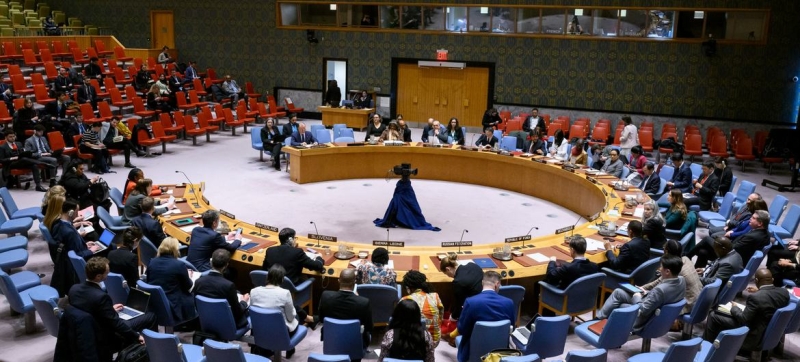
Meeting of the UN Security Council. A crisis with regional and global consequences: the Security Council discussed the situation in Myanmar Peace and Security
Violence is rising in Myanmar, population displacement continues, and the political and humanitarian crisis deepens. Amid reports of indiscriminate aerial bombing by the Myanmar military and artillery shelling from various directions, the number of civilian casualties continues to rise.
Khaled Hiyari, assistant to the UN chief for Asia, made this statement on Thursday at the Security Council. Today’s meeting on Myanmar, focusing mainly on the situation in Rakhine State, was the first open briefing at the Security Council since the military seized power in the country more than three years ago in February 2021. Until now, Council members could not agree on convening an open meeting on Myanmar; meetings were held in closed format – with the exception of one case, when in December 2022, the Security Council adopted resolution 2669, calling for an immediate end to violence throughout the country.
Violence in Rakhine
In Rakhine State, Myanmar’s poorest region, fighting between the country’s military and the Arakan Rohingya Salvation Army has led to unprecedented violence.
The Arakan Rohingya Salvation Army has reportedly gained territorial control over much of central Rakhine and is attempting to take control of northern Rakhine, where many members of the Rohingya Muslim community live.
“It is important that all parties in Rakhine protect the Rohingya population. Caught in the middle of the conflict, civilians, including the Rohingya, face serious security challenges and heightened inter-communal tensions,” Hiyari said.
“Rohingya communities in particular continue to face significant restrictions on freedom of movement, deprivation of citizenship, and remain disproportionately vulnerable to abduction or forced recruitment [to fight],” he added.
The Assistant Secretary-General said that given the current situation in Rakhine, the Rohingya who fled violence in Myanmar in 2017, mainly to neighboring Bangladesh, still have no opportunity to return home. The UN calls for more efforts to ensure this opportunity. Hiyari also recalled the participation of Rohingya refugees, who often die along dangerous migration routes.
“The rising number of desperate Rohingya refugees who are reportedly dying or going missing during risky boat journeys in the Andaman Sea and Bay of Bengal is alarming and underscores the need to find longer-term solutions for the Rohingya as soon as possible,” Hiyari said. .
“I want to take this opportunity to thank Bangladesh for its hospitable welcome to more than a million Rohingya refugees, most of whom fled Myanmar almost seven years ago,” he added.
Consequences for the region and the world
The UN also reminds that the crisis in Myanmar has a negative impact on the situation in the region and beyond. Fighting in key border areas has weakened security and law and order, leading to the spread of illegal activities.
Myanmar has become a global epicenter for methamphetamine and opium production. In addition, there are global operations in the field of cyber fraud, especially in border areas.
At the same time, criminal groups manage to attract the population to their activities, since people often cannot find other – legal – ways to earn money.
“What began as a regional crime problem in Southeast Asia has now become a rampant human trafficking and trafficking crisis with global implications,” Hiyari said .
As the crisis deepens, the UN is calling on the international community, especially neighboring countries, to use their influence to stop the violence and find a political solution.
